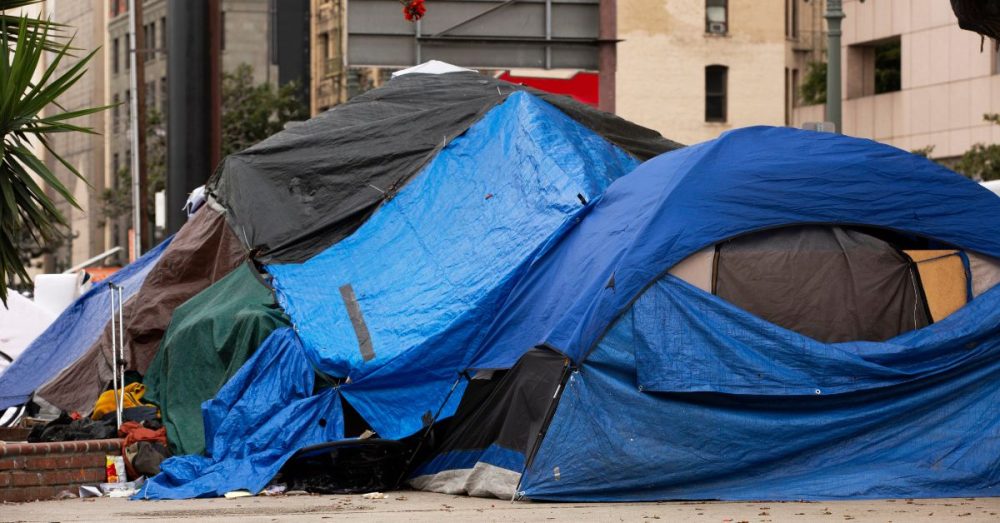People on both sides of the issue have been reacting to the Supreme Court’s decision to back an Oregon city ordinance prohibiting camping in public spaces, a ruling that effectively allows for municipal bans on homeless people sleeping outdoors in cities without shelters.
Theane Evangelis, an attorney who represented the City of Grants Pass, one of the litigants, celebrated the decision.
“The Court has now restored the ability of cities on the frontlines of [the homelessness] crisis to develop lasting solutions that meet the needs of the most vulnerable members of their communities while also keeping our public spaces safe and clean,” she said, according to the Oklahoma Voice.
Diane Yentel, president of the National Low Income Housing Coalition, condemned the decision.
“It gives cover to elected officials who choose political expediency over real solutions by merely moving unhoused people out of public view rather than working to solve their homelessness,” Yentel said, per the Oklahoma Voice. “These ineffective and inhumane tactics exacerbate homelessness by saddling unhoused people with debt they can’t pay while further isolating them from the services and support they need to become stably housed.”
The City of Grants Pass had adopted an ordinance prohibiting camping in public spaces, including sidewalks, streets, and alleyways. The measure defines a campsite as “any place where bedding, sleeping bag[s], or other material used for bedding purposes, or any stove or fire is placed … for the purpose of maintaining a temporary place to live.”
The small municipality does not have a homeless shelter. A district court had previously enjoined the city from enforcing its public camping ordinance, finding that since there were insufficient beds for the city’s homeless population, everyone without shelter was “involuntarily homeless.” The district court concluded that the Eighth Amendment of the U.S. Constitution prohibited Grants Pass from enforcing the ordinance.
A divided panel from the Ninth Circuit Court of Appeals agreed with the district court’s determination that all unsheltered individuals in Grants Pass qualify as “involuntarily homeless” and that vagrants and the truly homeless cannot be punished for camping. The city sought an en banc rehearing but was denied. An appeal to the Supreme Court followed.
As previously relayed by The Dallas Express, the high court ruled in favor of Grants Pass in a 6-3 decision. Justice Neil Gorsuch delivered the majority opinion of the court.
“Homelessness is complex. Its causes are many. So may be the public policy responses required to address it. … The Constitution’s Eighth Amendment serves many important functions, but it does not authorize federal judges to wrest those rights and responsibilities from the American people and in their place dictate this Nation’s homelessness policy,” Gorsuch wrote.
In a dissenting opinion, Justice Sonia Sotomayor wrote, “Sleep is a biological necessity, not a crime. For some people, sleeping outside is their only option. The City of Grants Pass jails and fines those people for sleeping anywhere in public at any time, including in their cars, if they use as little as a blanket to keep warm or a rolled-up shirt as a pillow. For people with no access to shelter, that punishes them for being homeless. That is unconscionable and unconstitutional. Punishing people for their status is ‘cruel and unusual’ under the Eighth Amendment.”
“Grants Pass’s Ordinances criminalize being homeless,” she continued. “The Ordinances’ purpose, text, and enforcement confirm that they target status, not conduct. For someone with no available shelter, the only way to comply with the Ordinances is to leave Grants Pass altogether.”
“The Eighth Amendment prohibits punishing homelessness by criminalizing sleeping outside when an individual has nowhere else to go. It is cruel and unusual to apply any penalty ‘selectively to minorities whose numbers are few, who are outcasts of society, and who are unpopular, but whom society is willing to see suffer though it would not countenance general application of the same penalty across the board,'” she concluded.
As previously reported by The Dallas Express, more than 75% of Dallas residents are not satisfied with the state of homelessness, panhandling, and vagrancy across the city.
Cities such as San Antonio have seen success with a “one-stop-shop” approach to addressing the homelessness crisis. San Antonio’s Haven for Hope has utilized this model, which has been credited with a 77% reduction in the city’s unsheltered homeless population in the downtown area. The City of Dallas has yet to try such a model despite Dallas residents having favorable views of such an approach.


